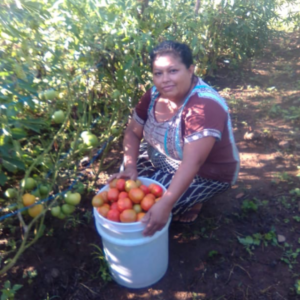How Climate-Smart Farming Innovations Address Food Insecurity in Nicaragua

Carrying one of the large plastic buckets she uses to hold what she harvests, Santos strolled down a long row of tomato plants. Attached to stakes, the plants stood nearly too high for her to see over. They were laden with fruit. Pausing periodically, Santos inspected them for ripeness, picking only the best and leaving the green ones for another day.
“When we are able to grow a variety of crops,” she explained, “it helps me to see a solution for my family’s own food. The garden gives me peace of mind in my home.”
Before she reached the end of the row, the bucket was filled with big red tomatoes.

In 2023, approximately 200,000 people in Nicaragua lacked consistent access to nutrient-rich food. Across the country, small community farms and gardens make a critical difference in the lives of people like Santos, her husband, and their four children. Family gardens can be an invaluable source of nutritious food that often can’t be found—or afforded—at the community market. That’s why in 2022, along with 987 farmers from communities similar to her own, Santos participated in climate resilience training delivered by the Council of Protestant Churches of Nicaragua (CEPAD) in partnership with Episcopal Relief & Development.
Months before signing up, she’d started thinking about turning her yard into a family garden, but she never pursued the idea due to a lack of technical knowledge, resources and materials. Santos explained that part of the program’s draw was not only the training and expert agricultural guidance, but also the packages of seed she received. To ensure crop diversity, a total of 1,500 pounds of seed was distributed to farmers across the country. In addition to tomatoes, Santos’ garden includes cucumbers, squash, cassava, cabbage, carrots, pineapple and several other crops planted strategically to be productive in both summer and winter.
Parents have passed down traditional farming techniques and information to their children for generations. Some of the information and guidance is valuable, but too often it doesn’t account for recent agricultural advances and innovations. As part of hands-on training, farmers like Santos learned to create chemical-free insecticides and organic fertilizers, construct micro dams to capture and conserve water, build barriers to prevent soil erosion and protect crops from the increasingly erratic and extreme weather events to which Nicaragua is so vulnerable, and a host of other adaptive, climate-smart skills and approaches.
When Santos first conceived the idea of cultivating a garden, she hoped it would supply her family with a reliable supply of nutritious food—which it has. But due to the work Santos puts into the garden, it produces more than she and her family can use, allowing Santos to sell the surplus in the community. “I know how much it costs me to produce,” she explained, “so I know how to sell it in the market at the right price.”
Notably, a family garden like the one Santos planted can strengthen household food security while contributing to a family’s income, but there are other less tangible benefits.
“The garden provides us a meeting space,” Santos reflected, sharing how she, her husband, and their four children often gather together. “We take advantage of that moment to talk,” she explained, “and I teach my children how to care for and work the land.”


